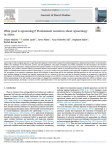Madsen S., Laske E., Fisher J., Sall A.N., Enloe S., Bezner Kerr R. (2025). What good is agroecology? Predominant narratives about agroecology in Africa. Journal of rural studies, 01/08/2025, vol. 118, p. 103706.
https://doi.org/10.1016/j.jrurstud.2025.103706
https://doi.org/10.1016/j.jrurstud.2025.103706
| Titre : | What good is agroecology? Predominant narratives about agroecology in Africa (2025) |
| Auteurs : | S. Madsen ; E. Laske ; J. Fisher ; A.N. Sall ; S. Enloe ; R. Bezner Kerr |
| Type de document : | Article |
| Dans : | Journal of rural studies (vol. 118, August 2025) |
| Article en page(s) : | p. 103706 |
| Langues : | Anglais |
| Langues du résumé : | Anglais |
| Catégories : |
Catégories principales 06 - AGRICULTURE. FORÊTS. PÊCHES ; 6.4 - Production Agricole. Système de ProductionThésaurus IAMM AGROECOLOGIE ; AGRICULTURE ; SYSTEME DE PRODUCTION ; AFRIQUE |
| Résumé : | Agroecology is still a marginal approach to agricultural development in Africa when compared to industrial approaches, despite growing evidence of its potential to address core challenges of food insecurity, poverty, and soil degradation. This paper investigates one possible explanation for this discrepancy: the discursive landscape of African agriculture. Taking inspiration from narrative analysis, we document stories about agroecology as told by key actors in the food system: farmers, pastoralists, NGO workers, extension officers, government officials, and researchers. Based on 208 interviews with key informants (KIs) across nine African case studies, we identified three distinct narratives: Agroecology is: 1) a tool in a toolbox 2) for poor farmers 3) the better path. In addition to these narratives, we report KIs' perceptions of two narrative components, namely their definition of agroecology and the key challenges affecting agriculture in their case study site. We use these problem framings to evaluate how logically agroecology fits as a solution in this story, and thus its discursive potential as an approach to agricultural development. We find that many respondents do not consider agroecology to be an effective or relevant solution to major food system challenges, or that they have a limited understanding of the full breadth of agroecology. We suggest that organizations seeking to promote agroecology guide their efforts according to a key agroecological principle, knowledge co-creation, to better understand farmers' views and experiences with specific agroecological practices in the African context. |
| Cote : | En ligne |
| URL / DOI : | https://doi.org/10.1016/j.jrurstud.2025.103706 |







